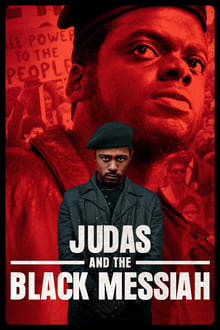
If you enjoy reading my Spoiler-Free reviews, please follow my blog @ https://www.msbreviews.com
Judas and the Black Messiah was a last-minute addition to this year’s Sundance, which basically changed every list about the most anticipated films of the festival, including my own. The buzz surrounding its Oscar chances, the remarkable cast, and mainly its important narrative based on true events were more than enough reasons to generate an undeniably powerful hype. When I watch movies inspired by real people and/or true stories, I want them to teach me about the historical moment they’re depicting. I want to finish my viewing sessions and know more than what I did at its beginning. I want the film to be enlightening, thought-provoking, and, most of all, impactful.
I’m just a young white man living in Portugal with no previous knowledge of who Fred Hampton was or what he did. The closest I got to learning something about him was during last year’s The Trial of the Chicago 7, but that movie wasn’t even focused on the Black Panther Party, let alone one of his most important revolutionaries. My voice is far from being meaningful in regards to this film, and I will share Black critics’ articles that I find to be worthy of investing your time in reading. However, I do have an opinion about this movie, and I’m in my right to share it. I find Shaka King’s flick to have all of the qualities I mentioned above and much more. One of the best films of the festival, and I’m not risking it by writing it will end up as one of my favorite movies of the year.
In all honesty, I found myself struggling to completely understand Fred Hampton's intent during the first half or so. His goals are clear and can be summed up in simply trying to offer everyone a better life, one that was fair and where everyone was treated equally. My issue wasn't in his motivations or beliefs, but on the violent, murderous path that Hampton was apparently inciting people to take - I repeat, I didn't know a single thing about the real story nor Hampton himself. However, Daniel Kaluuya's very first words as the character stuck with me until now - "We're not gonna fight fire with fire, we're gonna fight it with water. We're not gonna fight racism with racism. We're gonna fight it with solidarity. We're not gonna fight capitalism with Black capitalism. We're gonna fight it with socialism" - and he kept developing this idea, which I find incredibly timely.
The scene that ultimately cleared my perception of Hampton's ideas was when William O'Neal takes the latter's most famous speech at the end of the second act in its most literal sense, which leaves Hampton baffled and shocked at O'Neal's interpretation of his words. Hampton's reaction, as well as a more emotional moment with the mother of his child, Deborah Johnson (Dominique Fishback), was the click I needed to fully comprehend the revolutionary's desires. This is one of the best compliments I can offer Shaka King and Will Berson's exquisite, detailed screenplay. It doesn't make Hampton a flawless superhero that never makes mistakes but instead depicts him as a human being who fought for everyone's rights. The latter is closer to being a Messiah than the former.
The intricate narrative might feel a bit too heavy for some viewers, but it packs extraordinarily energetic, inspirational, chill-inducing speeches that I won't forget that soon. Both Hampton and O'Neal raise sensitive themes that will definitely leave the audience thinking and discussing them throughout the year. Despite it being the longest film of the festival, its two-hour runtime feels adequate and well-paced. In addition to this, the terrific, "in your face" cinematography (Sean Bobbitt) focuses on the actors' performances, not giving a chance to the viewers to be distracted with anything else besides the characters' words. The emotional investment in the characters elevates the well-edited (Kristan Sprague) shooting sequences that left me on the edge of my seat (couch), which ultimately serves as a huge praise to the movie's writing.
I left the cast for last. Now, I know 2021 just started, but if Daniel Kaluuya isn't nominated in every single awards show for the respective Best Supporting Actor category, I'll riot. I've yet to witness a less-than-great display from this unbelievably talented actor. Kaluuya is exceptionally captivating from the very first time he shows up on-screen and never drops his level. Lakeith Stanfield is also brilliant as a conflicted William O'Neal, delivering an extremely complex portrayal of someone who has to deal with actions he knows are wrong. Dominique Fishback and Jesse Plemons (Roy Mitchell, an FBI agent) also deserve a shoutout.
Judas and the Black Messiah deserves all the hype it’s been getting and some more. Shaka King and Will Berson deliver a film inspired by true events with all the qualities this type of movie needs: enlightening, inspirational, thought-provoking, and tremendously impactful. Boasting what I’m sure will end up as one of the year’s best performances (Daniel Kaluuya), the story of Fred Hampton and William O’Neal is told through an incredibly captivating narrative, filled to the brim with absolutely epic, riveting, chill-inducing speeches and dialogues that will leave no viewer indifferent. Both characters bring timely themes back to the spotlight, hopefully generating a critical discourse regarding freedom, human rights, and equality. Besides Kaluuya, Lakeith Stanfield deserves massive praise, and I can’t forget about the lingering, character-driven cinematography that elevates every single scene. Final shoutout to Mark Isham and Craig Harris’s unforgettable, addictive score that plays a significant role in the narrative.
Rating: A